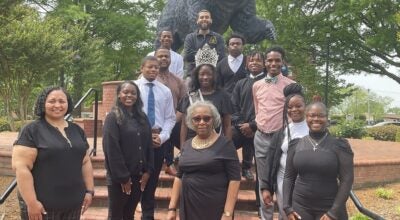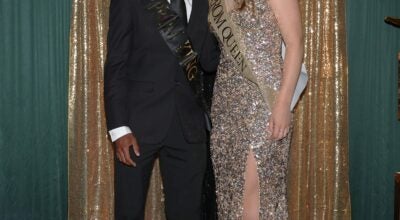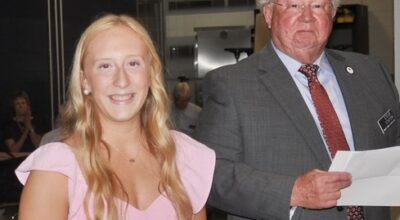Salisbury High graduate settling into life at West Point
Published 12:00 am Wednesday, December 28, 2011
By David Freeze
For the Salisbury Post
Imagine walking the same halls as great military leaders like Lee and Grant, Pershing and McArthur, Eisenhower, Patton, Swartzkopf or Patraeus. Salisbury High School graduate Philip Tonseth gets to do just that. Tonseth is attending West Point Military Academy and appreciates the history of what many consider the best undergraduate institution in America.
“Everyday there are tourists walking the grounds,” Tonseth says, “and I feel like I go to school in a museum.”
West Point Military Academy, located about 50 miles north of New York City on the Hudson River, was established by President Thomas Jefferson on March 16, 1802. George Washington called the location the “most important strategic position in America,” and the Academy continues as the oldest continuously occupied military post in the United States.
Forbes.com and U.S. News and World Report have both called West Point Military Academy the best public college or university in America.
Tonseth began his education at West Point this past summer with basic training called “Beast Barracks.” Most of the actual military training is done during the summers, with upperclassmen actually serving with active U.S. Army units.
There are 4,400 members, both male and female, of the Corps of Cadets, all academically, medically and physically qualified for the demanding level of leadership training. Most cadets were nominated by a member of the U.S. Congress.
West Rowan graduate Jon Crucitti is also a part of the “Long Gray Line.” Tonseth realized shortly after September 11, 2001, that he wanted to serve his country. He excelled academically and athletically at Salisbury High, starring in cross country, baseball and football.
“The overall schoolwork is very hard, and there is a huge amount of homework each night,” said Tonseth. He continued, “I have two roommates and it often helps to have more than one opinion. We have to be focused on school. I usually am up till 11 or 11:30 p.m. doing homework.” One roommate is from Washington, D.C., and another from New York City, who previously completed three years at another college before being accepted at West Point.
Tonseth described a typical day as beginning at about 6:20 a.m.
“There is a required knowledge that I have to know each day, such as what uniform to wear. We have to be in morning formation at 7 a.m., then we go to breakfast. Classes continue for most cadets till 4 p.m. Those who are involved in intercollegiate sports get out at 3 p.m. Others go from class to do something with their own company which includes intramurals. Dinner is from 6-7:30 p.m., but we don’t wait till 7 or most of the food will be gone. Afterwards, we do homework.”
Freshmen or plebes are only responsible for themselves. Personal hygiene, grades and all basic personal issues are included. Second-year students, called corporals or yuks, are responsible for mentoring a plebe, one-on-one.
“It is good to have this,” said Tonseth. “There is so much that we need to know. The sophomore is almost like a parent, doing his best to make sure that I don’t mess up.”
Upperclassmen eventually become responsible for squads or companies, with some rising to student leaders of the Corps of Cadets.
If cadets do mess up, they are given demerits. Demerits require punishment, but Tonseth is thankful that there are two levels of demerits.
“So far, I don’t have any serious demerits,” he said, “but I did have one for my sideburns being too long. My punishment was to clean the bathrooms and pick up trash for two hours.”
Serious demerits are punishable by walking tours that mean hours of patrolling the post grounds in full uniform.
A love of baseball encouraged Tonseth to help out with the baseball team.
“Being a team manager has helped me get acclimated to school,” he said. “Baseball has a spring and fall season at West Point. Some of my best friends are on the team, and I will get to travel with the team in the spring.”
Tonseth gets about 60 to 90 minutes of free time a day, but that includes getting a shower and taking care of personal things. His personal area can be inspected any morning, so everything has to be in its place.
There is a ski slope, skating rink and golf course on campus, along with lots of clubs like orienteering and rock climbing. Finding time to use them is a challenge in itself.
“With living so close together for four years, it helps with making friends and learning to interact with classmates. They normally walk in and out for a homework break or to get help with their work,” said Tonseth.
The biggest focus of Tonseth’s cadet life is academics. Class size is small. Faculty to student ratio is 1 to 8.
“The classes are challenging,” he said. “Everyone takes about the same things for the first two years. The focus is on the military aspect and how it will help us as future US Army officers. We will get to choose electives for our major during the last two years. There is an emphasis on math and sciences, but we also have literature, psychology, information technology, a foreign language, and history classes. Classes last for 55 minutes, except for chemistry, which is two class periods, and math is every day.”
Students select from more than 40 majors, graduating with a bachelor of science degree. All cadets graduate with a concentration in engineering. Following graduation, each cadet has committed to at least five years of active service.
“Being at West Point has definitely made me appreciate the finer and little things,” said Tonseth. “Every Friday I order a pizza and sit and watch a movie with a couple of my friends. I try to work out every day, and I take a walk around campus at least once a week to keep in touch with all the beautiful nature around me.
“I ready and willing to accept the challenges that West Point is sure to offer over my four years and can’t wait to do my duty with my brothers in arms when I graduate.





